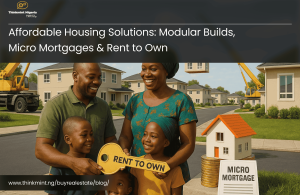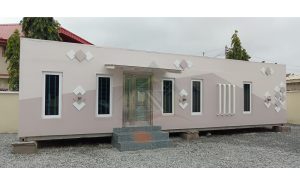
For millions of Nigerians, the dream of owning a home is slowly slipping away. The price of land, rising cement costs, and mortgage requirements are becoming out of reach for the average person.
Many even wonder if there is such a thing as “affordable housing in Nigeria”
Imagine you work so hard, save diligently, and yet the idea of owning a home still feels like chasing shadows. Traditional home financing options are built for the wealthy or salaried elite, leaving everyday Nigerians, from small business owners to civil servants, locked out of the property market.
And with Nigeria’s housing deficit surpassing 20 million units, the situation grows more urgent by the day.
But there’s good news: a new wave of affordable housing models is breaking that barrier. From modular builds that slash construction costs, to micro-mortgages that bring financing within reach, and rent-to-own schemes that let you pay as you live, these solutions are reshaping the future of homeownership in Nigeria.
In this article, you’ll discover how these three practical options are making it possible for more Nigerians to finally own a home without breaking the bank.
The Affordable Housing Crisis in Nigeria
Nigeria faces an estimated housing deficit of over 20 million units, with demand increasing every year due to urban migration and population growth. The majority of available homes are far beyond the reach of average citizens, especially in cities like Lagos, Abuja, and Port Harcourt.
Why is housing so expensive in Nigeria?
It is due to the following reasons:
1. High cost of land and building materials
2. Long and expensive construction timelines
3. Lack of access to affordable financing
4. Inadequate government support for low-cost housing
As a result, many Nigerians are stuck renting overcrowded apartments or living in substandard housing conditions. But now, new models are emerging that may finally close this gap.
1. Modular Builds: Building Homes Faster and Cheaper

What Are Modular Homes?
Modular homes (often called prefab or pre-engineered homes) are built in a factory, transported to the site, and assembled there. This construction method reduces time, labour, and waste, making it ideal for Nigeria’s housing challenges.
Benefits of Modular Construction in Nigeria.
✅ Faster delivery: A house can be ready in weeks, not months
✅ Lower cost: Less labour and bulk purchase of materials cut expenses
✅ Customisable designs to suit different budgets
✅ Reduced material waste, which means cleaner, more efficient construction
The Nigerian Examples:
Millard Fuller Foundation in Abuja is using modular systems to deliver homes below ₦4 million.
Best For:
Cooperative societies
Developers building mass housing
Government schemes
2. Micro-Mortgages: Financing Homes for the Average Nigerian
What Is a Micro-Mortgage?
A micro-mortgage is a small-scale home loan (usually below ₦10 million) that allows lower-income Nigerians to buy affordable homes or complete uncompleted buildings, without needing massive collateral or a high income.
Why It’s Crucial in Nigeria
✅ Most Nigerians earn below ₦150,000/month and can’t access traditional mortgages
✅ Micro-mortgages make home financing more inclusive
✅ Often paired with low-cost housing estates in places like Ogun, Ibadan, or Nasarawa
Real Examples
Family Homes Funds (FHF) offers low-interest micro-mortgages for houses priced under ₦5 million in partnership with developers.
LAPO Microfinance Bank and other microfinance institutions are offering home improvement and home purchase loans to low-income earners.
Ideal For:
Informal sector workers (keke drivers, market women, artisans)
First-time homebuyers earning under ₦200k monthly
Teachers, civil servants, and small business owners
3. Rent-to-Own: A Practical Path to Ownership
How It Works in Nigeria
With rent-to-own, tenants move into a home and gradually pay towards ownership. A portion of their monthly rent goes into a purchase plan, usually over 10–15 years.
This is ideal for Nigerians who cannot afford large upfront payments but want to transition from renting to owning.
Benefits
✅ Live in the home while paying for it
✅ Avoid large deposits and traditional mortgage stress
✅ Great for self-employed Nigerians and small business owners
Examples in Nigeria
Lagos State Rent-to-Own Housing Scheme offers homes in areas like Ikorodu, Igando, and Igbogbo with monthly payments as low as ₦30,000.
Federal Mortgage Bank of Nigeria (FMBN) also runs rent-to-own programs for NHF contributors.
Watch Outs
Be sure to read the fine print—some schemes require initial commitment fees
Ensure you’re working with a registered developer or a government scheme
Best For:
Renters looking for long-term stability
Young families
People without formal payslips or credit history
The Future of Affordable Housing in Nigeria
We’re beginning to see a blend of these solutions:
Some developers now build modular homes and offer rent-to-own options
Fintech startups like Seso Global and Sycamore.ng are working on digital platforms to simplify home financingGovernment agencies are increasingly pushing for public-private partnerships (PPPs) to deliver low-cost housing
Technology, innovation, and inclusive financing will continue to drive down housing costs and improve access for Nigerians.
Conclusion
Affordable housing in Nigeria is no longer a far-fetched dream. With modular builds reducing construction costs, micro-mortgages making financing accessible, and rent-to-own offering flexibility for renters, there’s something for everyone.
Whether you’re a young professional in Lagos or a trader in Ibadan, one of these models can help you take that bold step into homeownership.
FAQs
1. Are modular homes legal in Nigeria?
Yes, modular homes are legal and increasingly popular. They meet building codes and are approved in several government schemes.
2. Can I apply for a micro-mortgage without a payslip?
Yes. Many microfinance banks accept alternative income proof (like daily/weekly income from business or POS).
3. Is rent-to-own safe in Nigeria?
Yes, as long as you deal with verified developers or government-backed programs. Avoid unregistered real estate agents.
4. Which banks in Nigeria offer micro-mortgages?
Banks like Family Homes Funds, FMBN, and some microfinance banks like LAPO and AB Microfinance Bank offer such products.